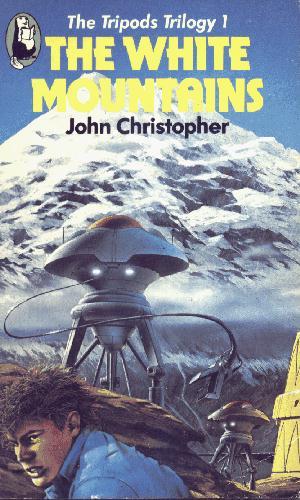Review: The White Mountains by John Christopher

I’ve being wanting to reread this for a long time. I remembering reading it when I was a wee one, and so was one of the things that got me interested in reading and in storytelling. But I finally did and you know what? It’s still pretty good. The prose is simple, but effective, and although the premise has been imitated a few times since, it still appeals to me.
So, this was a young adult novel written in 1967. It opens in the pastoral english countryside in what seems like simpler times, before the industrial age. Except for a few things, like clocks and a wind up watch from ‘olden times’ that the main is pretty taken with, signs in old ruins that say things like ‘Danger: 6600 Volts’. And also, there are bloody great big metal Tripods stomping around. Yes, it turns out this is the future. The Earth belongs to the Tripods and humans have become their slaves.
No one knows exactly what the Tripods are. Speculation offered is either they came from another or were man made machines that rebelled (we don’t find out in this book, but it’s a trilogy). The Tripods maintain control by ‘capping’ everyone when they reach the age of 14. Villages hold some ritual where a Tripod comes and takes the children who have come of age, shaving their heads and applying some kind of wire mesh cap. Eventually hair regrows through the cap, but the people who return are never quite the same. Any doubts or questions they might have had about the Tripods before vanish and they spend the rest of their lives in complete devotion to them. When Will sees this happen to his cousin Jack, he becomes quite keen not to have his free will taken away.
There also people called ‘Vagrants’ – people who, for whatever reason, the capping doesn’t quite go well on. They end up wandering around seeming confused and talking gibberish or in poetry quotes. But in a chance encounter with one such vagrants, who turns out to completely sane and actually one of the only sane adults around, Jack learns about The White Mountains, across the sea and far to the south, where free humans still live. And so he runs away from home to find them. This could all be a metaphor for fear of growing up and made to conform to society’s and stop asking questions. Or it could just be that having bloody great giant Tripods almost step on you is actually kind of scary.
He reluctantly allows another boy, Henry, to join him, and when they reach France befriend Jean-Paul, who they nickname Beanpole. No girls join the group and unlike modern YA novels there are no love triangles or really any romance at all. Except maybe the love of a French boy for science and hand grenades. Will does almost fall for a girl at one point, but turns out it would never have worked. On the way they also encounter more Tripods, a medieval castle, and the ruins of Paris.
Now, the science part of science fiction often ages very quickly, as real science jumps ahead. I didn’t really find that here, probably because the Tripods and their technology are way beyond the understanding of the characters and although they speculate a lot, the author never really tries too hard to explain everything. It’s left to the readers imagination. At least, in this book it is. It is the first of a trilogy (or quadrilogy, as a prequel was written some twenty years after this one). And of course I will be rereading the other books too.
So it doesn’t have the romance, awkward sex, or as much action as most modern YA novels have, but overall I think it still works pretty well. I give it four hand grenades out of a bouquet.

Leave a Reply